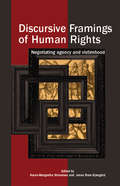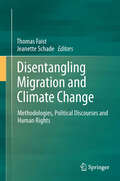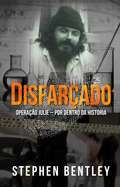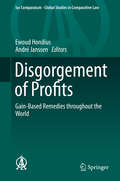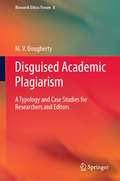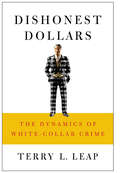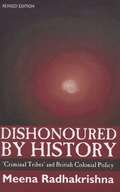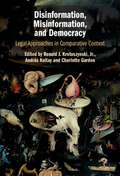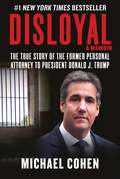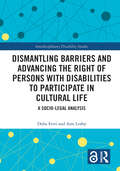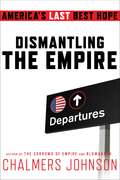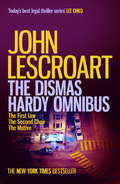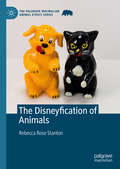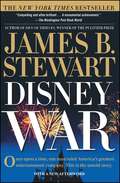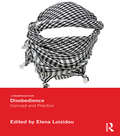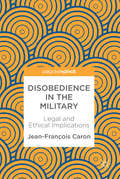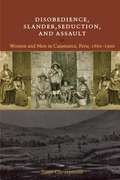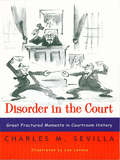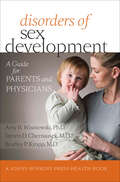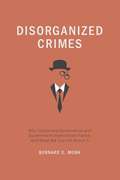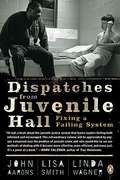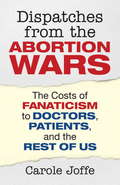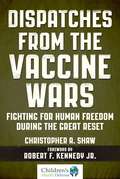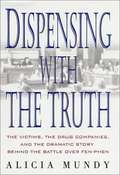- Table View
- List View
Discursive Framings of Human Rights: Negotiating Agency and Victimhood
by Karen-Margrethe Simonsen Jonas Ross KjaergardWhat does it mean to be a subject of human rights? The status of the subject is closely connected with the form and rhetoric of the framing discourse, and this book investigates the relationship between the status of the subject and the form of human rights discourse, in differing aesthetic and social contexts. Historical as well as contemporary declarations of rights have stressed both the protective and political aspects of human rights. But in concrete situations and conflictual moments, the high moral legitimacy of human rights rhetoric has often clouded the actual character of specific interventions, and so made it difficult to differentiate between the objects of humanitarian intervention and the subjects of politics. Critically re-examining this opposition – between victims and agents of human rights – through a focus on the ways in which discourses of rights are formed and circulated within and between political societies, this book elicits the fluidity of their relationship, and with it the shifting relation between human rights and humanitarianism. Analysing the symbolic framings of testimonies, disaster stories, atrocity tales, political speeches, and philosophical arguments, it thus establishes a relationship between these different genres and the political, economic, and legal dimensions of human rights discourse.
Disentangling Migration and Climate Change: Methodologies, Political Discourses and Human Rights
by Jeanette Schade Thomas FaistThis book addresses environmental and climate change induced migration from the vantage point of migration studies, offering a broad spectrum of approaches for considering the environment/climate/migration nexus. Research on the subject is still frequently narrowed down to climate change vulnerability and the environmental push factor. The book establishes the interconnections between societal and environmental vulnerability, and migration and capability, allowing appreciation of migration in the frame of climate as a case of spatial and social mobility, that is, as a strategy of persons and groups to deal with a grossly unequal distribution of life chances across the world. In their introduction, the editors fan out the current debate and state the need to transcend predominantly policy-oriented approaches to migration. The first section of the volume focuses on "Methodologies and Methods" and presents very distinct approaches to think climate induced migration. Subsequent chapters explore the sensitivity of existing migration flows to climate change in Ghana and Bangladesh, the complex relationship between migration, demographic change and coping capacities in Canada, methodological challenges of a household survey on the significance of migration and remittances for adaptation in the Hindu Kush region and an econometric study of the aftermath of the 1998 floods in Bangladesh. The second part, "Areas of Concern: Politics and Human Rights", deepens the analysis of discourses as well as of the implications of proposed and implemented policies. Contributors discuss such topics as environmental migration as a multi-causal problem, climate migration as a consequence in an alarmist discourse and climate migration as a solution. A study of an integrated relocation program in Papua New Guinea is followed by chapters on the promise and the flaws of planned relocation policy, global policy on protection of environmental migrants including both internally displaced peoples and those who cross international borders. A concluding chapter places human agency at centre stage and explores the interplay between human rights, capability and migration.
Disfarçado: Operação Julie – por dentro da história
by Stephen Bentley PAULA RIBEIRO F F DA ROCHAA Operação Julie ainda é hoje o ponto de referência para todas as operações secretas britânicas e treinamento. Em 2011, a BBC afirmou que essa operação policial massiva e única foi o início da guerra contra as drogas. Stephen Bentley foi um dos quatro detetives secretos envolvidos na Operação Julie, uma das maiores apreensões de drogas do mundo. Juntamente com seu parceiro disfarçado, ele se infiltrou na gangue que produzia cerca de 90% do LSD do mundo e descobriu um plano para importar grandes quantidades de cocaína boliviana para o Reino Unido. O submundo conhecia o autor como Steve Jackson. Como ele conseguiu se infiltrar nas duas gangues? Ele teve que usar drogas e como "viver uma mentira" o afetou? Descubra as respostas e entre na mente de Steve Jackson, detetive disfarçado. "A perspectiva de um insider sobre o tráfico de drogas, contada com charme, inteligência e, às vezes, humor, por um homem talentoso, singularmente qualificado para contar a verdadeira história." - Excerto de revisão
Disgorgement of Profits
by Ewoud Hondius André JanssenDisgorgement of profits is not exactly a household word in private law. Particularly in civil law jurisdictions - as opposed to those of the common law - the notion is not well known. What does it stand for? It is best illustrated by examples. One of the best known being the British case of Blake v Attorney General, [2001] 1 AC 268. In which a double spy had been imprisoned by the UK government before escaping and settling in the former Soviet Union. While there wrote a book on his experiences, upon which the UK government claimed the proceeds of the book. The House of Lords, as it then was, allowed the claim on the basis of Blake's breach of his employment contract. Other examples are the infringement of intellectual property rights, where the damages of the owner are limited, but the profits of the wrongdoer immense. In such cases, the question arises whether the infringing party should be disgorged of his profits. This volume aims at establishing the notion of disgorgement of profits as a keyword in the discourse of private law. It does not purport to answer the question whether or not such damages should or should not be awarded. It does however aim to contribute to the discussion, the arguments in favour and against, and the organisation of the various actions.
Disguised Academic Plagiarism: A Typology and Case Studies for Researchers and Editors (Research Ethics Forum #8)
by M. V. DoughertyThis volume is the first book-length study of disguised forms of plagiarism that mar the body of published research in humanities disciplines. As a contribution to applied research ethics, this practical guide offers a typology of the principal forms of disguised plagiarism. It provides detailed analyses, in-depth case studies, and useful flow charts to assist researchers, editors, and publishers in protecting the integrity of the body of published research literature. Disguised plagiarism is more subtle than copy-and-paste plagiarism; all its varieties involve some additional concealment that creates further distance between the plagiarizing text and its source. These disguised forms are the most difficult forms of plagiarism to detect. Readers of the volume will become acquainted with the subtler forms of plagiarism that corrupt the production and dissemination of knowledge in humanities fields. The book is valuable not only to those interested in research ethics, but also to those in humanities fields including philosophy, theology, and history.
Dishonest Dollars: The Dynamics of White-Collar Crime
by Terry L. LeapIn an environment where corporate scandals fill the headlines and ethics courses have suddenly become standard fare in business schools, Terry Leap offers welcome insights into and useful ways of thinking about a critical problem that permeates our society. His main contribution is an integrative model of white-collar crime, which smoothly incorporates influences from sociology, psychology, public policy, and business. As he explains the process that occurs across the many different categories of crimes within organizations, he finds that there are more similarities than differences between "criminals in the suites" and "criminals in the streets."Leap's definition of crimes within organizations and the people who commit them are laid out in his first chapter. He then goes on to discuss the causes of and events surrounding white-collar crime, types of crimes and criminals, the decision-making processes of white-collar criminals, and the impact of these crimes. His concluding chapter predicts future trends in corporate crime, including an explanation of why we are likely to see more crime in health care. Throughout, Leap presents numerous specific examples and cases—from famous meltdowns such as Enron and WorldCom to less-publicized incidents including a weight-loss franchisee mislabeling doughnuts as low fat and a CEO of a South Carolina regional transportation authority misusing taxpayer money for lavish meals, personal expenses, and world travel.
Dishonorable Passions: Sodomy Laws in America, 1861-2003
by William N. EskridgeA fascinating one-of-a-kind history of the government's regulation of sexual behavior <P> From the Pentagon to the wedding chapel, there are few issues more controversial today than gay rights. As William Eskridge persuasively demonstrates in Dishonorable Passions, there is nothing new about this political and legal obsession. The American colonies and the early states prohibited sodomy as the "crime against nature," but rarely punished such conduct if it took place behind closed doors. By the twentieth century, America's emerging regulatory state targeted "degenerates" and (later) "homosexuals." The witch hunts of the McCarthy era caught very few Communists but ruined the lives of thousands of homosexuals. The nation's sexual revolution of the 1960s fueled a social movement of people seeking repeal of sodomy laws, but it was not until the Supreme Court's decision in Lawrence v. Texas (2003) that private sex between consenting adults was decriminalized. With dramatic stories of both the hunted (Walt Whitman and Margaret Mead) and the hunters (Earl Warren and J. Edgar Hoover), Dishonorable Passions reveals how American sodomy laws affected the lives of both homosexual and heterosexual Americans. Certain to provoke heated debate, Dishonorable Passions is a must-read for anyone interested in the history of sexuality and its regulation in the United States.
Dishonoured by History: 'Criminal Tribes' and British Colonial Policy
by Meena RadhakrishnaThis book explores how colonial policies converted itinerant groups on the one hand into a source of cheap labor and on the other into a category known as 'criminal tribes'. It also examines missionary activity, especially the Salvation Army.
Disinformation, Misinformation, and Democracy: Legal Approaches in Comparative Context
by Ronald J. Krotoszynski Jr. András Koltay Charlotte GardenIn today's digital age, the spread of dis- and misinformation across traditional and social media poses a significant threat to democracy. Yet repressing political speech in the name of truth can also undermine democratic values. This volume brings together prominent legal scholars from democracies worldwide to explore and evaluate different regulatory approaches for addressing this complex problem – all taking into account that the cure must not be worse than the disease. Using a comparative lens, the book offers important and novel insights into methods ranging from national regulation of politicians' speech to empowering civil-society groups that are well-positioned to blunt the effects of disinformation and misinformation. The book also provides solutions-oriented recommendations for policymakers, judges, legal practitioners, and scholars seeking to promote democratic values by encouraging free political speech while combatting disinformation and misinformation. This title is also available as Open Access on Cambridge Core.
Disloyal: The True Story of the Former Personal Attorney to President Donald J. Trump
by Michael CohenOnce Donald Trump’s fiercest surrogate, closest confidant, and staunchest defender, Michael Cohen knows where the skeletons are buried. <p><p> This is the most devastating business and political horror story of the century. As Trump’s lawyer and “fixer,” Cohen not only witnessed firsthand but was also an active participant in the inner workings of Trump’s business empire, political campaign, and presidential administration. <p> This is a story that you have not read in newspapers, or on social media, or watched on television. These are accounts that only someone who worked for Trump around the clock for over a decade—not a few months or even a couple of years—could know. Cohen describes Trump’s racist rants against President Barack Obama, Nelson Mandela, and Black and Hispanic people in general, as well as the cruelty, humiliation, and abuse he leveled at family and staff. Whether he’s exposing the fact that Trump engaged in tax fraud by inflating his wealth or electronic fraud by rigging an online survey, or outing Trump’s Neanderthal views towards women or his hush-money payments to clandestine lovers, Cohen pulls no punches. <p> He shows Trump’s relentless willingness to lie, exaggerate, mislead, or manipulate. Trump emerges as a man without a soul—a man who courts evangelicals and then trashes them, panders to the common man, but then rips off small business owners, a con man who will do or say absolutely anything to win, regardless of the cost to his family, his associates, or his country. <p> At the heart of Disloyal, we see how Cohen came under the spell of his charismatic "Boss" and, as a result, lost all sense of his moral compass. <p> The real "real" Donald Trump who permeates these pages—the racist, sexist, homophobic, lying, cheating President—will be discussed, written about, and analyzed for years to come.<p> <b>A New York Times Bestseller</b>
Dismantling Barriers and Advancing the Right of Persons with Disabilities to Participate in Cultural Life: A Socio-Legal Analysis (Interdisciplinary Disability Studies)
by Delia Ferri Ann LeahyThe right to participate in cultural life is profoundly rooted in international human rights law, and, with regard to persons with disabilities, it is enunciated in Article 30 of the UN Convention on the Rights of Persons with Disabilities (CRPD or the Convention). This provision requires States Parties to the Convention to ensure accessibility of cultural materials, services and activities, and cultural heritage, and to support the creative and artistic potential of persons with disabilities. However, people with disabilities continue to face barriers to cultural participation. On foot of a pan-European empirical study and a socio-legal analysis, this book discusses the normative content of Article 30 CRPD and its implementation. It identifies and categorises barriers to cultural participation, highlighting new paths to operationalise Article 30 CRPD. This book will be of interest to scholars and students working in disability law, socio-legal studies, international human rights law, as well as cultural studies, disability studies, and cultural policies.
Dismantling the Empire: America's Last Best Hope
by Chalmers JohnsonThe author of the bestselling Blowback Trilogy reflects on America's waning power in a masterful collection of essays. In his prophetic book Blowback, published before 9/11, Chalmers Johnson warned that our secret operations in Iraq and elsewhere around the globe would exact a price at home. Now, in a brilliant series of essays written over the last three years, Johnson measures that price and the resulting dangers America faces. Our reliance on Pentagon economics, a global empire of bases, and war without end is, he declares, nothing short of "a suicide option." Dismantling the Empire explores the subjects for which Johnson is now famous, from the origins of blowback to Barack Obama's Afghanistan conundrum, including our inept spies, our bad behavior in other countries, our ill-fought wars, and our capitulation to a military that has taken ever more control of the federal budget. There is, he proposes, only one way out: President Obama must begin to dismantle the empire before the Pentagon dismantles the American Dream. If we do not learn from the fates of past empires, he suggests, our decline and fall are foreordained. This is Johnson at his best: delivering both a warning and an urgent prescription for a remedy.
The Dismas Hardy Omnibus: A trio of gripping crime thrillers you won’t be able to put down
by John LescroartA collection of three Dismas Hardy classics by master storyteller John Lescroart, in what has been described by Lee Child as 'Today's best legal series'. Perfect for fans of John Grisham and William J. Coughlin. The First Law:An elderly shop owner is found dead. Glitsky is hitting brick walls as he tries to get help from homicide, while Hardy finds himself defending a friend who's been accused of the death. Blocked at every turn, Hardy and Glitsky are forced to protect themselves, as well as their nearest and dearest, as they step into a world where the only law is survival...The Second Chair: Hardy has a high-profile and challenging case: a seventeen-year-old arrested for the double slaying of his girlfriend and his teacher. With little belief in his client's innocence, and even less in the legal system, Hardy has to conquer his own demons if he is to clear his client...and save himself.The Motive: Glitsky is thrust into a controversial double homicide investigation. Convinced the officer has the wrong suspect - Hardy's old girlfriend - he breaks ranks to continue his own investigation. And so begins a search that reveals a trail of deception that leads beyond San Francisco, where exposing secrets can be the most deadly offence...What readers are saying about the Dismas Hardy series:'The storylines are always strong and each book is satisfying on every level''If you like courtroom drama and legal thrillers, this series never disappoints''The more we get to know Dismas Hardy and the other characters of John Lescroart's San Francisco, the more we appreciate them as well-drawn, three-dimensional characters'
The Disneyfication of Animals (The Palgrave Macmillan Animal Ethics Series)
by Rebecca Rose StantonThis book critically examines how Walt Disney Animation Studios has depicted – and sometimes failed to depict – different forms of harming and objectifying non-human animals in their films. Each chapter addresses a different form of animal harm and objectification through the theories of speciesism, romanticism, and the ‘collapse of compassion’ effect, from farming, hunting and fishing, to clothing, work, and entertainment. Stanton lucidly presents the dichotomy between depictions of higher order, anthropomorphised and neotonised animal characters and that of lower-order species, showing furthermore how these depictions are closely linked to changing social attitudes about acceptable forms of animal harm. An engaging and novel contribution to the field of Critical Animal Studies, this book explores the use of animals not only in Disney’s best known animated films such as 101 Dalmatians, but also lesser known features including Home on the Range and Fun and Fancy Free. A quantitative appendix supplying data on how often each animal species appears and the amount of times animal harm or objectification is depicted in over fifty films provides an invaluable resource and addition to scholars working in both Disney and animal studies.
DisneyWar: The Battle for the Magic Kingdom
by James B. Stewart"When You Wish Upon a Star," "Whistle While You Work," "The Happiest Place on Earth" -- these are lyrics indelibly linked to Disney, one of the most admired and best-known companies in the world. So when Roy Disney, chairman of Walt Disney Animation and nephew of founder Walt Disney, abruptly resigned in November 2003 and declared war on chairman and chief executive Michael Eisner, he sent shock waves through the entertainment industry, corporate boardrooms, theme parks, and living rooms around the world -- everywhere Disney does business and its products are cherished. DisneyWar is the breathtaking, dramatic inside story of what drove America's best-known entertainment company to civil war, told by one of our most acclaimed writers and reporters. Drawing on unprecedented access to both Eisner and Roy Disney, current and former Disney executives and board members, as well as thousands of pages of never-before-seen letters, memos, transcripts, and other documents, James B. Stewart gets to the bottom of mysteries that have enveloped Disney for years: What really caused the rupture with studio chairman Jeffrey Katzenberg, a man who once regarded Eisner as a father but who became his fiercest rival? How could Eisner have so misjudged Michael Ovitz, a man who was not only "the most powerful man in Hollywood" but also his friend, whom he appointed as Disney president and immediately wanted to fire? What caused the break between Eisner and Pixar chairman Steve Jobs, and why did Pixar abruptly abandon its partnership with Disney? Why did Eisner so mistrust Roy Disney that he assigned Disney company executives to spy on him? How did Eisner control the Disney board for so long, and what really happened in the fateful board meeting in September 2004, when Eisner played his last cards? Here, too, is the creative process that lies at the heart of Disney -- from the making of The Lion King to Pirates of the Caribbean. Even as the executive suite has been engulfed in turmoil, Disney has worked -- and sometimes clashed -- with a glittering array of stars, directors, designers, artists, and producers, many of whom tell their stories here for the first time. Stewart describes how Eisner lost his chairmanship and why he felt obliged to resign as CEO, effective 2006. No other book so thoroughly penetrates the secretive world of the corporate boardroom. DisneyWar is an enthralling tale of one of America's most powerful media and entertainment companies, the people who control it, and those trying to overthrow them. DisneyWar is an epic achievement. It tells a story that -- in its sudden twists, vivid, larger-than-life characters, and thrilling climax -- might itself have been the subject of a Disney animated classic -- except that it's all true.
Disobedience: Concept and Practice
by Elena LoizidouDisobedience has been practiced and considered since time immemorial. The aim of this edited collection is to explore the concept and practice of disobedience through the prism of contemporary ideas and events. Past writings on disobedience represented it as a largely political practice that revealed the limits of government or law. It was not, for example, thought of as a subjective exigency and its discussion in relation to law and politics was tied to an unduly narrow conception of these terms. Disobedience: Concept and Practice reveals the multivalent, multidisciplinary and poly-local nature of disobedience. The essays in this volume demonstrate how disobedience operates in various terrains, and may be articulated in relation to textuality, aesthetics and subjectivity, as well as politics and law. A rich and useful guide to current legal, political and social possibilities, this book provides a fresh perspective on a subject that is of both historical importance and contemporary relevance.
Disobedience in the Military: Legal and Ethical Implications
by Jean-François CaronWe often think of the army as an institution whose members are required to blindly obey all orders they receive. However, this perception is inaccurate. Disobedience is a fundamental professional obligation of members of the military and overrides the obligation to follow commands. But what is the extent of this obligation? Are soldiers obligated to participate in what they consider to be an illegal war, or should they be allowed to enjoy a right to selective conscientious objection? Should soldiers obey a legal order that, if followed, would facilitate the perpetration of war crimes by a third party? How should soldiers act if they are ordered to follow a lawful order that could result in immoral consequences? Should soldiers be allowed to refuse to obey what can be labeled as suicidal orders? Based upon the nature of soldiers’ professional obligations, this book tries to offer answers to these important questions. The author turns to a number of different case-studies, including conscientious objections, duty to protect in genocidal situations such as Rwanda and Srebrenica, suicidal orders in wars, as well as retribution and leniency towards war criminals, as a way of assessing the different legal and ethical implications of disobedience in the military.
Disobedience, Slander, Seduction, and Assault: Women and Men in Cajamarca, Peru, 1862-1900
by Tanja ChristiansenThough the law and courts of nineteenth-century Peru were institutions created by and for the ruling elite, women of all classes used the system to negotiate the complexities of property rights, childrearing, and marriage, and often to defend their very definitions of honor. Drawing on the trial transcripts of Cajamarca, a northern Peruvian province, from more than a century ago, this book shares eye-opening details about life among this community, in which reputation could determine a woman's chances of survival.
Disorder in the Court: Great Fractured Moments in Courtroom History
by Charles M. SevillaIn America's courtooms, the verdict is laughter. Sit back and enjoy a collection of verbatim exchanges from the halls of justice, where defendants and plaintiffs, lawyers and witnesses, juries and judges, collide to produce memorably insane comedy. A: You mumbled on the first part of that and I couldn't understand what you were saying. Could you repeat the question? Q: I mumbled, did I? Well, we'll just ask the court reporter to read back what I said. She didn't indicate any problem understanding what I said, so obviously she understood every word. We'll just have her read my question back and find out if there was any mumbling going on. Madam reporter, would you be so kind? Court Reporter: Mumble, mumble, mumble, mumble, mumble.
Disorders of Sex Development: A Guide for Parents and Physicians (A Johns Hopkins Press Health Book)
by Amy B. Wisniewski Steven D. Chernausek Bradley P. KroppCompassionately written by an experienced team of professionals, this book offers parents and families essential information about the causes, diagnosis, and treatment of disorders of sex development, or DSD.DSD refers to medical conditions, usually discovered at birth, in which there is disagreement between a person's genetic sex (i.e., chromosomes) and the appearance of the person's external or internal reproductive structures. After their child is diagnosed with DSD, parents need answers to a host of questions, including• What is DSD, why does it occur, how is it identified, and how is it treated?• Did we do something to cause our child's DSD?• Is my baby a boy or a girl?• Will my child grow up to be normal and healthy?• Does my child need surgery?This concise book answers parents' questions in a reassuring and forthright way, giving affected individuals, their families, and their health care providers a current and evidence-based picture of DSD. It offers clear explanations of how newborns with DSD are evaluated, diagnosed, and treated; describes the different kinds of DSD; and pays close attention to both psychosocial and medical aspects of DSD. This guide also includes information about the importance of support groups and education for affected individuals and their families.In their daily work, the authors treat, support, and educate people with DSD and their families. This resource gives parents and families access to the authors' expertise so they can reach a meaningful understanding of their child's DSD and make informed decisions about their child's health.
Disorganized Crimes
by Bernard E. MunkCorporate misgovernance and the failure of government regulation have led to major financial fiascos. 'Disorganized crimes' are disruptive and costly. Munk links the two major eras of corporate misgovernance during the last decade to explain how these events occur and what can be done to prevent them from re-occurring.
Dispatches from Juvenile Hall
by John AaronsA revolutionary book that offers a fresh, bold approach to confronting the juvenile crime epidemic With the rise of violent crimes committed by teenagers in recent years, heated discussion has arisen over the societal factors that lead to juvenile criminality and the ways that public institutions are failing to curtail them. Now a team of experts with decades of collective hands-on experience present a book that cuts through the hype and paranoia to offer real solutions. Drawing on actual case studies, Dispatches from Juvenile Hall shows how conventional ?tough on crime? tactics have only worsened the problem, and presents a new blueprint for change that incorporates punitive action, rehabilitation, and family intervention?a progressive program that will encourage and enlighten all those concerned about the future of our youth. .
Dispatches from the Abortion Wars
by Carole JoffeSurprising firsthand accounts from the front lines of abortion provision reveal the persistent cultural, political, and economic hurdles to access More than thirty-five years after women won the right to legal abortion, most people do not realize how inaccessible it has become. In these pages, reproductive-health researcher Carole Joffe shows how a pervasive stigma--cultivated by the religious right--operates to maintain barriers to access by shaming women and marginalizing abortion providers. Through compelling testimony from doctors, health-care workers, and patients, Joffe reports the lived experiences behind the polemics, while also offering hope for a more compassionate standard of women's health care. From the Trade Paperback edition.
Dispatches from the Vaccine Wars: Fighting for Human Freedom During the Great Reset (Children’s Health Defense)
by Christopher A. ShawEnter the trenches of the bloodiest battles you've never heard of: the Vaccine Wars. Professor Christopher A Shaw discovered, after a deep-dive literature search on aluminum impacts on humans and animals, that aluminum hydroxide, an adjuvant in the anthrax vaccine, had a significantly negative impact on motor functions and reflexes of patients in the literature. After that finding, he did what scientists are supposed to do and kept following the leads. However, organizations like WHO dismissed him immediately. Those powerful organizations either knew what he knew, that aluminum vaccine adjuvants were harmful, or they simply didn&’t care. In either case, two possible reasons for the lack of response became clear to Shaw and his colleagues: dogma and money. The first had served to convince most of the world&’s medical professionals that Shaw had to be wrong because, after all, &“the science was settled.&” And, behind much of this was the naked fact of how much money vaccines brought in to cover the pharmaceutical industry&’s profit margin. The combination of those two have the finger prints of various Big Pharma companies smudged all over the question of vaccine safety, which included the demonization of both scientists and lay scholars who raised even the tamest questions about safety and the push for vaccine mandates around the world. After these events, Shaw decided to dig deeper.Dispatches from the Vaccine Wars is a comprehensive look at the origin of vaccination and the oversight of vaccines by various regulatory bodies in the United States and in Canada. The book provides not only the official view on vaccines safety and efficacy, but also provides a critical analysis on which such views are based. Aluminum and other compounds that may contribute to autism spectrum disorder are discussed at length. Professor Shaw also analyzes the corporate influences driving vaccine uptake worldwide and provides an in depth look at the push for mandatory vaccination. Dispatches from the Vaccine Wars evaluates the extent to which vaccinology has become a cult religion driving attempts to suppress divergent scientific opinions. Finally, the book delves into the COVID-19 pandemic and what it means for the future of us all.
Dispencing with the Truth: The Victims, the Drug Companies, and the Dramatic Story Behind the Battle Over Fen-Phen
by Alicia MundyIn 1996, a terrible epidemic began killing young American women. Some died quickly, literally dropping in their steps. Others took more time, from a few months to a few years. Those who weren't killed suffered damage to their lungs and hearts, much of it permanent and reparable only with major surgery. Doctors suspected what the killer was. So did the Food and Drug Administration. The culprits were the two most popular diet drugs in the United States, Pondimin, one-half of the popular drug combination Fen-Phen, and Redux, a stronger version of Pondimin. They were also two of the most profitable drugs on the market, and both were produced and sold by a powerful pharmaceutical company, Wyeth-Ayerst, a division of American Home Products. Dispensing the Truth is the gripping story of who really knew about the drugs, the ways they kept this information from the public, doctors, and FDA, and the massive legal battles that ensued as victims and their attorneys searched for the truth behind the debacle. It tells the story of a healthy young woman, Mary Linnen, who took the drugs for only twenty-three days to lose weight before her wedding, and then died in the arms of her fiance a few months later. Hers was the first wrongful-death suit filed and would become the most important single suit the company would ever face. Alicia Mundy provides a shocking and thoroughly riveting narrative. It is a stark look at the consequences of greed and a cautionary tale for the future.
